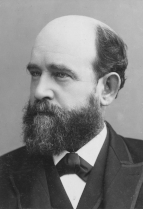Henry George was a 19th century American economist. He began with the ethical premise that all people have an equal right to the use of the earth. From that he concluded that exclusive private ownership of land (natural resources) creates unwarranted special privileges. Furthermore, he observed that holding land out of production drives down real wages and the returns to capital equipment. This process is further exacerbated by taxes on production and income that:
•increase unemployment
•discourage productive investment
•encourage unproductive land speculation and rent-seeking
To counteract this self-destructive system, George advocated shifting taxes from labor and capital onto the value of land and natural resources.
In addition to his various writings, Henry George was well known for his two attempts to run for mayor of New York (during the first of which he came in second and a young Theodore Roosevelt came in third). He also traveled around the world promoting his vision of economic justice by his inspiring oratory. Many a young reformer got their start by reading or hearing Henry George. In Russia, George’s ideas were popularized by Leo Tolstoy, and in China by Sun Yat-Sen. Today, as a growing population confronts its need fairly, peacefully, and efficiently to allocate access to the gifts of nature, the ideas of Henry George have gained a new relevance.
Articles about this new relevance today can be found on this site. There is the stirring piece, “Who Was Henry George?”, by his granddaughter, the celebrated choreographer, Agnes DeMille. Also, you can read one of the best introductions of George’s thought: “Henry George and the Reconstruction of Capitalism” by the late Prof. Robert V. Andelson; and one of the best expositions of his relevance as “the Great Reconciler” of opposing economic systems, “Henry George 100 Years Later” by Prof. Mason Gaffney.
